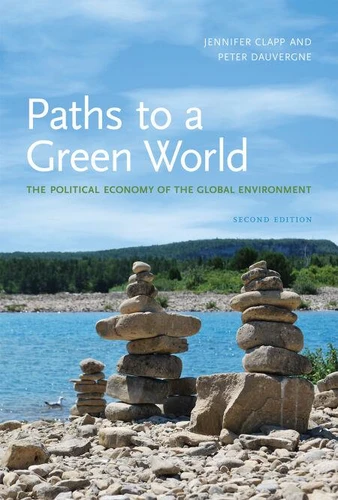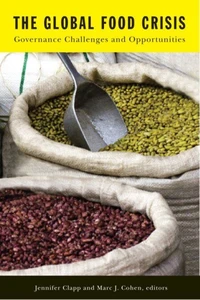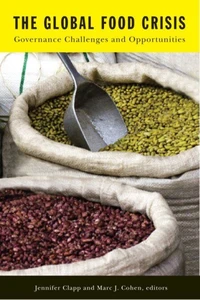Paths to a Green World, second edition. The Political Economy of the Global Environment
Par : ,Formats :
Disponible dans votre compte client Decitre ou Furet du Nord dès validation de votre commande. Le format ePub protégé est :
- Compatible avec une lecture sur My Vivlio (smartphone, tablette, ordinateur)
- Compatible avec une lecture sur liseuses Vivlio
- Pour les liseuses autres que Vivlio, vous devez utiliser le logiciel Adobe Digital Edition. Non compatible avec la lecture sur les liseuses Kindle, Remarkable et Sony
- Non compatible avec un achat hors France métropolitaine
 , qui est-ce ?
, qui est-ce ?Notre partenaire de plateforme de lecture numérique où vous retrouverez l'ensemble de vos ebooks gratuitement
Pour en savoir plus sur nos ebooks, consultez notre aide en ligne ici
- Nombre de pages384
- FormatePub
- ISBN978-0-262-29462-1
- EAN9780262294621
- Date de parution11/03/2011
- Protection num.Adobe DRM
- Taille2 Mo
- Infos supplémentairesepub
- ÉditeurThe MIT Press
Résumé
A new edition of a book that takes a comprehensive look at the ways economic processes affect global environmental outcomes. This comprehensive and accessible book fills the need for a political economy view of global environmental politics, focusing on the ways international economic processes affect environmental outcomes. It examines the main actors and forces shaping global environmental management, particularly in the developing world.
Moving beyond the usual emphasis on international agreements and institutions, it strives to capture not only academic theoretical debates but also views on politics, economics, and the environment within the halls of global conferences, on the streets during antiglobalization protests, and in the boardrooms of international agencies, nongovernmental organizations, and industry associations. The book maps out an original typology of four contrasting worldviews of environmental change-those of market liberals, institutionalists, bioenvironmentalists, and social greens-and uses them as a framework to examine the links between the global political economy and ecological change.
This typology provides a common language for students, instructors, and scholars to discuss the issues across the classical social science divisions. The second edition of this popular text has been thoroughly revised and updated to reflect recent events, including the food crisis of 2007-2008, the financial meltdown of 2008, and the Copenhagen Climate Conference of 2009. Topics covered include the environmental implications of globalization; wealth, poverty, and consumption; global trade; transnational corporations; and multilateral and private finance.
Moving beyond the usual emphasis on international agreements and institutions, it strives to capture not only academic theoretical debates but also views on politics, economics, and the environment within the halls of global conferences, on the streets during antiglobalization protests, and in the boardrooms of international agencies, nongovernmental organizations, and industry associations. The book maps out an original typology of four contrasting worldviews of environmental change-those of market liberals, institutionalists, bioenvironmentalists, and social greens-and uses them as a framework to examine the links between the global political economy and ecological change.
This typology provides a common language for students, instructors, and scholars to discuss the issues across the classical social science divisions. The second edition of this popular text has been thoroughly revised and updated to reflect recent events, including the food crisis of 2007-2008, the financial meltdown of 2008, and the Copenhagen Climate Conference of 2009. Topics covered include the environmental implications of globalization; wealth, poverty, and consumption; global trade; transnational corporations; and multilateral and private finance.
A new edition of a book that takes a comprehensive look at the ways economic processes affect global environmental outcomes. This comprehensive and accessible book fills the need for a political economy view of global environmental politics, focusing on the ways international economic processes affect environmental outcomes. It examines the main actors and forces shaping global environmental management, particularly in the developing world.
Moving beyond the usual emphasis on international agreements and institutions, it strives to capture not only academic theoretical debates but also views on politics, economics, and the environment within the halls of global conferences, on the streets during antiglobalization protests, and in the boardrooms of international agencies, nongovernmental organizations, and industry associations. The book maps out an original typology of four contrasting worldviews of environmental change-those of market liberals, institutionalists, bioenvironmentalists, and social greens-and uses them as a framework to examine the links between the global political economy and ecological change.
This typology provides a common language for students, instructors, and scholars to discuss the issues across the classical social science divisions. The second edition of this popular text has been thoroughly revised and updated to reflect recent events, including the food crisis of 2007-2008, the financial meltdown of 2008, and the Copenhagen Climate Conference of 2009. Topics covered include the environmental implications of globalization; wealth, poverty, and consumption; global trade; transnational corporations; and multilateral and private finance.
Moving beyond the usual emphasis on international agreements and institutions, it strives to capture not only academic theoretical debates but also views on politics, economics, and the environment within the halls of global conferences, on the streets during antiglobalization protests, and in the boardrooms of international agencies, nongovernmental organizations, and industry associations. The book maps out an original typology of four contrasting worldviews of environmental change-those of market liberals, institutionalists, bioenvironmentalists, and social greens-and uses them as a framework to examine the links between the global political economy and ecological change.
This typology provides a common language for students, instructors, and scholars to discuss the issues across the classical social science divisions. The second edition of this popular text has been thoroughly revised and updated to reflect recent events, including the food crisis of 2007-2008, the financial meltdown of 2008, and the Copenhagen Climate Conference of 2009. Topics covered include the environmental implications of globalization; wealth, poverty, and consumption; global trade; transnational corporations; and multilateral and private finance.






